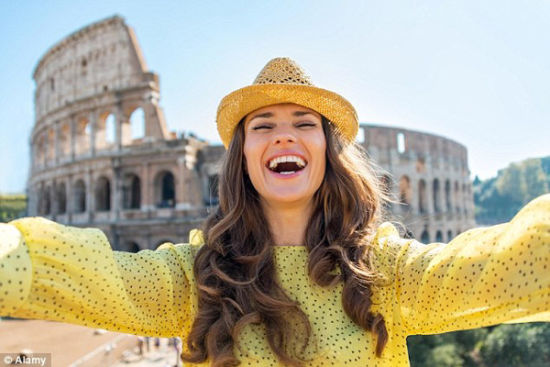英语热词:欧盟新规地标建筑前禁自拍(图)

扫描关注少儿英语微信
 欧盟新规地标建筑前禁自拍
欧盟新规地标建筑前禁自拍Be careful if you're planning to take any 'selfies' in front of iconic monuments this summer. A new EU law banning the posting of photographs on social media sites containing public buildings could be in force by next week。
今夏如果您想在地标建筑前自拍,可要当心了。欧盟很可能在下周出台一项新的法规,禁止人们将包含公共建筑的照片发布在社交媒体网站上。
The craze for tourists to take selfies in front of landmarks is on the rise, with an estimated one million taken every day around the world. While the law is aimed at commercial photographers, there are fears ordinary holidaymakers could be prosecuted and face a fine or even a jail sentence。
越来越多的游客在地标建筑前自拍。据估计,全世界每天会有一百万张此类照片。尽管此法针对的是商业摄影者,但普通游客恐怕也可能被起诉,并接受罚款甚至坐牢的处罚。
The rise of social media has spawned a raft of tourists for whom the ability to instantly publicise their trip is as important as the experience itself. The Eiffel Tower is the most popular spot in the world to take a selfie, ahead of Disney World in Orlando, Florida and the world's tallest building – the Burj Khalifa – in Dubai, according to tourist attraction site AttractionTix, which analysed social media to find mentions of travel hotspots alongside the world selfie. Big Ben is in fourth place, followed by the Empire State Building in New York, Gaudi’s iconic Sagrada Familia cathedral in Barcelona and then Disneyland Paris. Rome's Colosseum, the Rockefeller Centre in New York and London Bridge were also in the top ten 'selfie spots'。
随着社交媒体的风靡,很多游客认为,实时发布旅途经历甚至比旅行本身更重要。旅游网站AttractionTix分析了社交媒体中出现的全球热门旅游景点及相关自拍,发现最热的自拍地点依次是埃菲尔铁塔、奥兰多和佛罗里达的迪士尼乐园,以及世界第一高楼——迪拜哈利法塔。大本钟名列第4,纽约帝国大厦、巴塞罗那圣家族教堂(西班牙建筑师高迪的代表作品)和巴黎迪士尼乐园紧随其后。榜单前10名还包括古罗马斗兽场、纽约洛克菲勒中心及伦敦塔桥。
The UK and other European countries including Spain and Germany, is currently protected by a 'freedom of panorama' provision in copyright law which means people can publish photographs of modern buildings or public art installations without infringing copyright。
目前,英国、西班牙、德国等欧洲国家的版权法有一项“全景自由”条款,即公众有权将现代建筑物及公共艺术设施的照片公开。
If the law is passed, then members of the public will only be able to upload photographs of tourist spots with prior consent from the owner of the copyright. Or photographers may need to black out iconic buildings like the Eiffel Tower in their holiday snaps to avoid breaching the copyright of individual architects or artists。
若此项法规获得通过,未经版权所有者批准,公众不得上传该景点照片。或者拍摄者需将标志性建筑进行遮盖处理后方可公布,比如,遮盖旅行照片中记录下的埃菲尔铁塔。
With an increasing number of tourist hot spots discouraging or even banning selfie sticks, Disneyland has become the latest to announced a total ban: From June 30 selfie sticks will no longer be allowed in Disneyland, Walt Disney World, and any other Disney-owned theme parks, water parks, or gaming attractions. A roller coaster at Disney California Adventure park was closed recently for an hour after a passenger brought a selfie stick onboard。
越来越多的热门旅游景点不提倡甚至禁止游客使用自拍杆。迪士尼乐园成为自拍杆的最新禁地:自6月30日起,游客禁止在迪士尼乐园、迪士尼世界和其它迪士尼旗下的主题乐园、水上乐园及游戏场所使用自拍杆。近日,由于一名游客携带自拍杆乘坐过山车,加州的迪士尼冒险乐园被迫关闭一小时。
The Palace of Versailles and Britain's National Gallery in London also announced bans recently, saying they needed to protect artworks and other visitors.
凡尔赛宫及位于伦敦的英国国家美术馆近日也宣布禁用自拍杆,称这是为保护艺术品及其他游客。
Although the EU says amending the law is aimed at commercial photographers, there is a widespread fear that ordinary tourists will be penalised, with a so-called 'Facebook Police' combing websites to find and prosecute selfie-takers。
尽管欧盟称修改法律是针对商业摄影者,但大家普遍担心普通民众也将受到处罚,因为所谓的“脸书警察”正在搜查网站并起诉自拍者。
Online encyclopedia Wikipedia has declared itself against the move and plans to publish users' photos of popular sites like the Louvre to illustrate the 'madness' of the new proposals。
在线百科全书维基百科表示反对修改法律,并准备发布用户在卢浮宫等热门景点的照片以表现新法规的“丧心病狂”。
Booking system specialist Amadeus IT Holdings has released a report showing many travellers increasingly plan their trips so as to increase their social standing and maximise online followers, with the aim of instantly documenting photographs on Facebook, Twitter, Instagram et al。
预订系统专业方案提供方Amadeus IT Holdings发布的报告显示,越来越多的游客为提高自身社会地位、尽可能涨粉而规划行程,他们最主要的目的就是实时在Facebook, Twitter, Instagram等社交媒体上分享照片。
'Destinations that lack...cachet...risk being shunned. Benefits of digitally documented trips include basking in adulation like a rock star returning from a world tour', according to the study.
此项研究称,“游客很可能故意避开不出名的景点。旅行照片存储电子化能让人们享受到被粉丝崇拜的乐趣,就像摇滚歌手结束一次全球巡演时的感受一样。”
But the penalty for copyright infringement can be heavy。
然而一旦违反版权法律,处罚可能很严重。
In France, it is illegal to publish a photograph of the Eiffel Tower by night. Prior permission must be obtained from operating company Société d’Exploitation de la Tour Eiffel (SETE), which owns the rights for lit-up images. One lawyer commented that SETE could sue an individual for posting a lit up Eiffel Tower picture on Instagram, 'if [SETE] felt an image of the Eiffel Tower taken at night had been published or reproduced for commercial gain and without permission'。
在法国,发布埃菲尔铁塔的夜景照是违法的。人们必须事先得到埃菲尔铁塔营运管理公司(SETE)的许可,因为埃菲尔铁塔夜景的版权归其所有。一名律师评论称,“如果SETE认为,被公开或者经处理的埃菲尔铁塔夜景照未经批准,且用于商业用途”,则可以起诉将照片公布在Instagram的个人。
Vocabulary
a raft of: 大量
black out: 抹掉,涂掉
cachet: 威信,声望
bask in: 沉浸于
adulation: 盲目崇拜
- 英语科普:莎士比亚发明的10个常用单词2015-07-01 14:35
- 洗衣服时玩的趣味英语游戏(图)2015-07-01 11:47
- 想要学好英语你需要做到哪些方面(图)2015-07-01 11:18
- 英国牛津等大学怕学生英语不好 考试可带辞典2015-07-01 07:54

